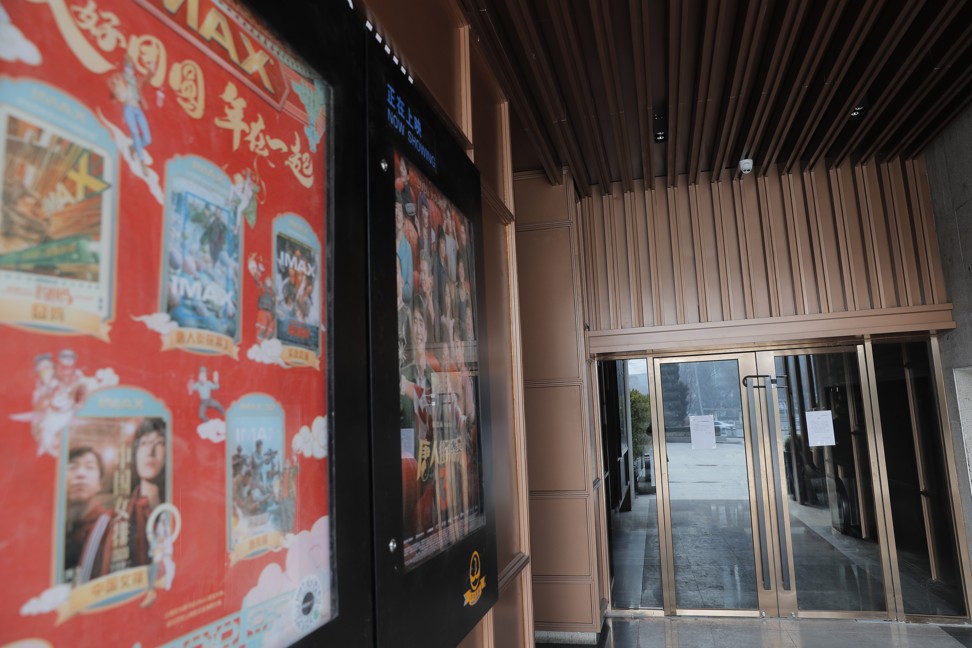
Coronavirus: how straight-to-streaming film successes threaten cinemas in China
- Because China has closed its cinemas amid the virus outbreak as part of steps to avoid large gatherings, some films are going straight to streaming platforms
- With many Chinese people stuck at home, viewing figures are through the roof, and cinema owners are worried about their future

Streaming giant Netflix upended the film industry by making straight-to-streaming films. It has been shortening cinematic release windows or skipping them altogether before releasing films in a video-on-demand format.
This exasperates Hollywood studios and cinema chains across the West, which rely on long exclusive cinematic releases to attract the public.
Until last month China, the world’s second-largest film market, which generated over 60 billion yuan (US$8.6 billion) at the box office last year, had not been affected by the phenomenon. The Chinese public still flock to cinemas in their droves – there are over 60,000 cinema screens across the country.
However, the coronavirus outbreak forced production companies to cancel cinematic releases and push out new films on streaming platforms when the country’s cinemas were all ordered to close by the government as part of measures to curb the spread of the virus.

The first Chinese filmmaker to take the unprecedented step of releasing a film via streaming is Xu Zheng, who announced last month that his new film Lost in Russia, which cost 300 million yuan to make, would be made available for free streaming from the first day of Lunar New Year. He made the decision after it was dropped from cinemas together with six other blockbuster Lunar New Year films.
Chinese media reported that Bytedance, which owns streaming platform Xigua Video and short-video apps Douyin and Huoshan, paid 630 million yuan to Huanxi Media, which produced Lost in Russia, for the streaming rights.

Xu’s gambit paid off; he earned widespread accolades for providing free home entertainment as a form of mental support to those trapped at home due to the virus. In its first three days on Bytedance’s platforms, 180 million users watched the film. By way of comparison, the highest-grossing Chinese movie before the virus triggered the countrywide cinema closures – Sheep Without a Shepherd – attracted only 35 million cinema-goers during a 44-day run.
Cinema owners reacted with fury to the overwhelming success of Lost in Russia on streaming platforms, and called for a boycott of Huanxi Media.
In a January 24 letter, 23 cinema wrote to the China Film Administration calling for it to block the arrangement between Huanxi Media and Bytedance. The letter said cancelling the cinematic release of Lost in Russia would have a negative impact on the window for films’ cinematic release and was “at odds with the fee-paying model nurtured by [the movie] industry for years”.
“This is a deliberate act of destruction of the existing China movie industry and its distribution systems,” the letter said.

The reaction of the Chinese cinema chains mirrored the vitriolic response of counterparts in the West to Netflix. Traditionally, Hollywood studios, and even online giant Amazon, have observed the film distribution industry’s practice of having a 90-day theatrical release window, which means a film will run in cinemas for three months before becoming available online.
Cinema owners want a longer window, as they can attract paying audiences for extended periods before they have the option of streaming the films at home.
With the coronavirus outbreak showing no signs of abating, and undeterred by the backlash from cinema chains, Hong Kong filmmaker Wong Jing, who produced Enter the Fat Dragon, starring martial arts superstar Donnie Yen Ji-dan, followed Xu in striking a deal with iQiyi, China’s answer to Netflix, to show the film on the streaming platform from February 1.

While Lost in Russia is screened online free of charge, iQiyi members pay six yuan and non-members 12 yuan to view Wong’s film on the platform.
Wong says: “China is actively fighting the coronavirus and people are encouraged to stay at home and avoid public gatherings. It is not possible to schedule new film releases in cinemas in the short term. In order for audiences to access this premium content as soon as possible, we decided to release the film on iQiyi, hoping it would give everyone a glimmer of sunshine amid the haze.”
An iQiyi spokesman says the film viewing habits of the Chinese public have changed due to the outbreak of coronavirus. “[This new] mode … allows users to view the latest releases online … while also enabling film producers to obtain greater revenue by establishing more distribution channels.”

“The mode is expected to be a healthy development for the film sector, [as streaming] platforms can attract more users by providing high-quality content, [and] users are more willing to pay for high-quality films, while film producers [can] launch more high-quality work with the platforms’ support.”
While iQiyi and Wong embraced the practice of skipping a cinematic release for Enter the Fat Dragon, Yen expressed regret at the decision on Weibo.
“As the main actor and co-producer [of the film], the decision [made me sad]. Making an action movie is much more difficult than doing other genres, especially this time when I had to play a fat guy weighing 125kg.
“As a moviemaker, I hope that my fans and audience can enjoy the comprehensive pleasurable visual and audio movie viewing experience on the big movie screen. This is the collective wish of every moviemaker.”
China is actively fighting the coronavirus and people are encouraged to stay at home and avoid public gatherings. It is not possible to schedule new film releases in cinemas in the short term
With some contagion experts predicting the coronavirus outbreak will last for months, and films due for release in cinemas this week in time for Valentine’s Day missing out, this new straight-to-video model for releases is certain to continue. Influential film stars and cinema owners are powerless to stop the virus upending the long-standing film distribution model in China.
Besides launching new films to attract new users, streaming platforms have launched online concerts, documentaries about the medical profession, and specialised channels to provide updates, and debunk false rumours, about the contagion.
Chinese short-video app Bilibili collaborated with Strawberry Music Festival to stage stay-at-home concerts last week. Since its launch in 2009, the festival has been held annually in different parts of China. This year, due to the coronavirus outbreak, concerts are being delivered online.

They include replays of live performances from previous music festivals featuring more than 70 musicians and bands. The festival’s organiser, Modern Sky, also arranged for artists to upload videos to Bilibili of them performing music at home.
A Bilibili spokesman says the online event is intended to give viewers a sense of community, and the fun of being at a large event, while they may be stuck at home, isolated from friends and colleagues.
iQiyi launched a nine-part documentary, Chinese Doctors, on January 27 to leverage the sudden and overwhelming public interest in the medical profession. The series follows the daily work of doctors and other medical personnel from six hospitals in China.
The series has earned rave reviews – getting a score of 9.3 out of 10 on film and TV series rating site Douban – for its fly-on-the-wall portrayal of the thankless task of healing the sick in China.
Want more articles like this? Follow SCMP Film on Facebook